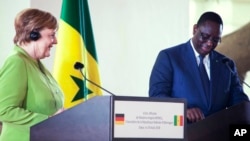German Chancellor Angela Merkel arrived in Senegal late Wednesday on a three-nation West African visit focusing on economic development and migration.
Merkel is meeting with the presidents of Senegal, Ghana and then Nigeria as she presses for further investment in a region that is a source of many of the migrants who make their perilous way toward Europe.
Migrant arrivals in Europe across the Mediterranean from Africa and Turkey are at their lowest level in five years, but the issue remains sensitive. Merkel, who refused to close Germany's borders at the height of the migrant crisis in 2015, has toughened her stance recently to salvage her government from a rift over the issue.
Some in Europe hope that investing more in West Africa will help keep people in a region plagued with unemployment, dodgy infrastructure, rising extremism and now the effects of climate change from leaving.
"We must fight illegality but also create legality and conditions for work here on the ground," Merkel said after meeting with Senegalese President Macky Sall, according to her spokesman Steffen Seibert. "We want to help with the future."
A day before leaving for Africa, the German leader hosted U2 frontman Bono for a discussion on Africa and its "development opportunities," the Chancellery said in an Instagram post .
Senegal and Ghana are two of Africa's fastest-growing economies and among its most stable countries. Both have signed on to the Compact with Africa initiative to promote private investment that Germany launched last year during its presidency of the Group of 20 industrialized and developing nations.
Nigeria is West Africa's regional power, Africa's most populous country and one of the continent's top oil producers. It is plagued, however, by widespread corruption and security threats that include Boko Haram and Islamic State-linked extremists in the north, violent clashes between herders and farmers in the central region and oil militants in the south.
Merkel on Tuesday spoke with the new leader of another of Africa's top economies, Ethiopian Prime Minister Abiy Ahmed, and invited him to visit, his chief of staff Fitsum Arega said on Twitter. Germany is just one of the countries responding with curiosity to the recent reconciliation between Ethiopia and neighboring Eritrea, with Germany's development minister visiting the long-reclusive country last week.




